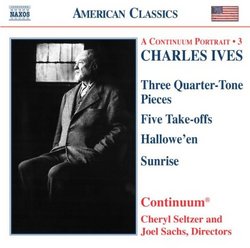| All Artists: Charles Ives, Continuum, Joel Sachs, Cheryl Seltzer, Victoria Villamil, Sheila Schonbrun Title: Charles Ives: Three Quarter-Tone Pieces; Five Take-offs; Hallowe'en; Sunrise Members Wishing: 1 Total Copies: 0 Label: Naxos American Release Date: 3/22/2005 Genres: Pop, Classical Styles: Vocal Pop, Opera & Classical Vocal, Chamber Music, Forms & Genres, Suites, Historical Periods, Classical (c.1770-1830), Modern, 20th, & 21st Century, Instruments, Keyboard Number of Discs: 1 SwapaCD Credits: 1 UPC: 636943919422 |
Search - Charles Ives, Continuum, Joel Sachs :: Charles Ives: Three Quarter-Tone Pieces; Five Take-offs; Hallowe'en; Sunrise
 | Charles Ives, Continuum, Joel Sachs Charles Ives: Three Quarter-Tone Pieces; Five Take-offs; Hallowe'en; Sunrise Genres: Pop, Classical
|
Larger Image |
CD Details |
CD ReviewsVisionary Ives Robin Friedman | Washington, D.C. United States | 06/01/2005 (5 out of 5 stars) "This review is dedicated to the memory of Bob Zeidler who shared on this site his love for and knowledge of the music of Charles Ives.
The Naxos "American Classics" series offers an unparalleled opportunity to get to know the music of the great American composer, Charles Ives (1874-1954). Prior CDs in the series focused on Ives's larger works, such as the symphonies, violin sonatas, and the Concord piano sonata. In contrast to the earlier releases, this CD includes a mix of shorter works performed by Continuum, a wonderful group of musicians based in New York City specializing in the performance of modern music. The CD had been released some years ago on Musical Heritage Society, and the release on Naxos was funded by the National Endowment for the Arts and the Charles Ives Society, Inc. There is every reason to be grateful. Much of the music on this disk will be unfamiliar to many listeners, and it bristles with difficulties. Yet, unlike the case with other avant garde music, there is an unmistakable joyousness to these pieces -- a zest for life, a feeling for the United States and its potential, and a transcendent vision. An inspiring CD indeed! There are three broad sections to this disk. The first section consists of nine short unrelated pieces, beginning with Ives's well-known song "The Housatonic at Stockbridge." The section also includes an eloquent short song, "Remembrance" which Ives wrote upon the death of his father, his mentor and inspiration. The works on this section are filled with raucousness and lyricism, often at the same time. Besides the two works mentioned, the highlights include "Halloween, for chamber ensemble, which begins quietly and works itself into a frenzy, and Ives's song "Sunrise" for voice, piano, and violin obligato which was his last completed work. The second section on the program consists of Ives's "Five Take-Offs" for solo piano performed here by Joel Sachs, co-director of Continuum. Ives composed these pieces in 1909, but they remained unperformed until 1968. These pieces juxtapose with great effect the traditional and the outrageous. The first piece, "The Seen and the Unseen", for example contrasts a line with an almost blusey feel (shared by other pieces on the CD) with a background of clangorous chords in the piano. The next piece, called "Jumping Frog" again begins quietly but works itself up to a frenetic pace over a huge piano accompaniment. The third piece, "Songs without (Good) Words" draws on Mendelsohn for inspiration. It remains quiet and lyrical throughout while the harmonies become more complex. The final two pieces, "Some Episode" and "Bad Resolution and Good WAN" are mostly reflective and quiet, with the exception of a riotous passage at the close -- the good resolution. The third work on this CD is Ives at his knottiest. The "Three Quarter-Tone Pieces" dates from 1924 and was composed for two pianos tuned one-quarter-tone apart. This is again the language of the blues as well as the language of modernity. The pianists here are Cheryl Seltzer and Joel Sachs, the co-directors of Continuum. The opening Largo contrasts deep banging chords on the piano against light swirling figures in the treble. The second movement, "allegro" has a ragtime feel as clashing chords alternate with swirling filigree in the pianos' upper register. The finale, "Chorale" works itself into an intense climax based upon themes from "America" with a hint of "La Marseilles" at the end for good measure. This is invigorating, difficult and rewarding music. The CD is somewhat short (less than 50 minutes). It will introduce the listener to some of the wilder creations of America's greatest composer." |

 Track Listings (17) - Disc #1
Track Listings (17) - Disc #1